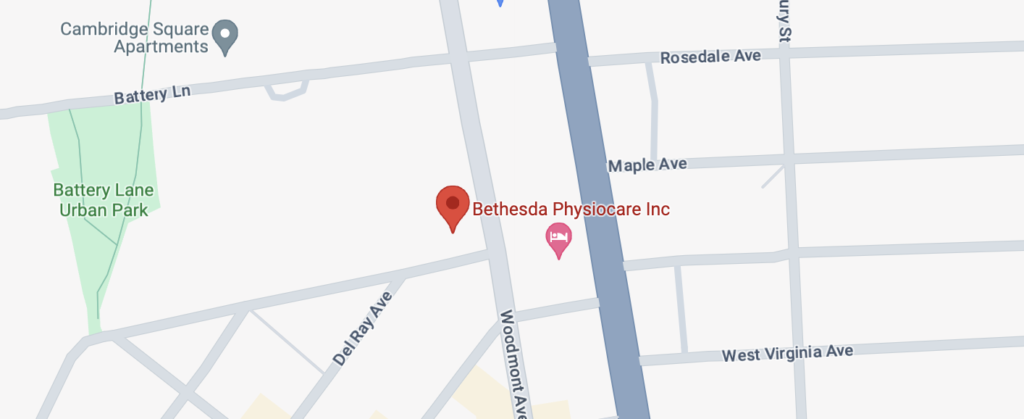Dysautonomia & Postural Orthostatic Tachycardia Syndrome (POTS)
Learn More About Autonomic Dysfunction
Having a balanced autonomic nervous system is essential. A balanced autonomic nervous system relies on a healthy working relationship between the sympathetic (fight or flight) and parasympathetic (rest and digest) nervous systems. When the sympathetic nervous system becomes dominant, it can result in dysautonomia. A common form of dysautonomia is Postural Orthostatic Tachycardia Syndrome (POTS). Many of our patients with connective tissue disorders, Ehlers-Danlos Syndrome, or Marfan’s Syndrome have components of dysautonomia that affect their physical therapy treatment program.
Our physical therapist team at Bethesda Physiocare is well-versed in the different kinds of dysautonomia disorders to provide patients with a tailored program teaching them how to function and live a quality life by optimizing their nervous system function.
Book a session with our physical therapy clinic in Bethesda today by calling (301) 656-5613.
What are Dysautonomia Symptoms?
In a state of dysautonomia, the autonomic nervous system (ANS) can no longer appropriately regulate bodily functions like heart rate, hormonal function, bladder function, and many more, resulting in several mishaps that can disrupt your daily life.
There are at least 15 forms of dysautonomia, many of which may have overlapping symptoms or a diagnosis of more than one form. However, with manual therapy, exergaming, and muscle strengthening, living with impaired autonomic dysfunction can become more manageable.
Who is at Risk?
While nearly 70 million people experience dysautonomia, there is no one specific group that is at risk. However, certain forms can. For instance, people exposed to a virtual or bacterial infection are more likely to develop Postural Orthostatic Tachycardia Syndrome (POTS). Or, a more rare case, Multiple System Atrophy (MSA), can occur in adults ages 40 and up. However, by far, the most common presentation in our clinic is in patients with connective tissue disorders such as Ehlers-Danlos Syndrome and other hypermobility disorders.
What Causes Dysautonomia
In patients with Ehlers-Danlos Syndrome (EDS), it is thought that connective tissue laxity in the circulatory system and venous return (blood returning to the heart) are factors that contribute to dysautonomia. Other considerations are that patients with EDS may have sympathetic neurogenic dysfunction due to autoimmune factors.
What are the Symptoms?
Symptoms vary from person to person and from form to form. Some symptoms include, not are limited to:
Balance problems
Chest pain
Large swings in heart rate/blood pressure
Fainting
Migraines
Swings in body skin and temperature
Difficulty controlling bodily functions (urination, erectile dysfunction)
If you are experiencing several of these symptoms, call our physical therapy clinic in Bethesda (301) 656-5613 to find a dysautonomia treatment plan that works for you.

How is Dysautonomia Treated?
Dysautonomia can be treated through a combination of diet, medication, and physical therapy. By working with one of our experts on physical rehabilitation in Bethesda, manual therapy can be an option to improve joint range of motion, reduce soft tissue inflammation and swelling, and increase blood flow.
Similarly, a regime of light exercises may be assigned depending on the severity of a patient’s symptoms to increase the intensity to improve their conditions gradually. While dysautonomia is not curable, it can be managed through these techniques.
Why Choose Bethesda Physiocare
Dysautonomia can be challenging to diagnose properly without expert professionals knowing where to look or how to treat it properly. But at Bethesda Physiocare, you can always expect one-on-one care with a designated expert physical therapist in Bethesda, MD.
Our clinic is different, we utilize state-of-the-art technology and exergaming equipment to maximize function in patients with dysautonomia. We can safely and effectively teach patients how to strengthen their muscles and improve their cardiovascular function all while having fun. Many of our clients with dysautonomia report that physical therapy at Bethesda Physiocare is much more engaging than traditional physical therapy.
Our team works alongside you to best evaluate your symptoms in ample time. Once we find the triggers of your dysautonomia, our physical therapy clinic will design a treatment plan just for you. Your plan can be a combination of persistent pain management and treatments, such as manual therapy, our hypermobility program, and more. That way, our Bethesda physical therapist team can eliminate your discomfort and pain while providing the best ways for you to take care of your nervous system in the future.
Feel Better Today!
While symptoms and forms of dysautonomia can be overwhelming, working with your Bethesda Physiocare clinician can help relieve you of some of the stress. So don’t wait to get ahead of your symptoms with our management and treatment plan made just for you for long-lasting results.
Give our physical therapy clinic in Bethesda a call at (301) 656-5613 to take control of your dysautonomia today!



